UK anti-racism protests: 'Justice will follow' the 'thuggery', Patel says
Home Secretary Priti Patel has said "justice will follow" some of the violence seen during anti-racism protests across the UK at the weekend.
Ms Patel said the majority of demonstrators "were peaceful" and told them: "I hear you."
But she echoed Prime Minister Boris Johnson's comment that the protests had been "subverted by thuggery" after some demonstrators clashed with police.
Meanwhile, the Voice newspaper's head called for restraint from protesters.
Anti-racism protests have taken place across the world, following the death of George Floyd, 46, in Minneapolis, in the US, after a white police officer was filmed kneeling on his neck.
Thousands of people attended largely peaceful demonstrations across the UK over the weekend, including London, Manchester and Glasgow.
Unrest in the capital on Sunday led to 35 officers being injured and 36 people being arrested for offences including violent disorder, criminal damage and assaulting police, the Metropolitan Police said on Monday.
Of the officers injured, two required hospital treatment, with one suffering a head wound and the second a shoulder injury after being hit by a thrown bottle.
In Bristol, police are continuing to investigate the "criminal damage" of a bronze statue of Edward Colston - a prominent 17th Century slave trader - which was ripped down by protesters, a move Downing Street called a "criminal act".
The statue has been a source of controversy in Bristol for years. The city's mayor said he felt no "sense of loss" at the statue being pulled down.
Speaking in the House of Commons, Ms Patel urged people not to attend future protests, saying due to the coronavirus any large gatherings of people were "currently unlawful".
She said 137,500 people had attended more than 200 protests across the UK over the weekend and the majority were peaceful.
But she condemned a "lawless minority of protesters" who "regrettably turned to violence", adding: "this hooliganism is utterly indefensible". She said 135 people had been arrested in total.
She was challenged by a Labour MP Florence Eshalomi, who asked her whether she recognised the "structural inequality, discrimination and racism" in the UK and called on her to act.
But Ms Patel said she would "not take lectures" from others about racism, and gave examples of the racist abuse she had personally received, including facing racial slurs in the playground and on the streets, and being advised to use her husband's surname in order to advance her career.
Meanwhile, Chancellor Rishi Sunak issued a statement saying he knows racism exists in the UK, but that "a better society doesn't happen overnight".
Mr Sunak condemned the acts of violence and added a message for the peaceful protesters: "Whilst our progress feels slow, I promise you it is permanent."
There have been repeated calls in recent years to remove the Colston statue. Protesters have said seeing the statue removed was "empowering" and it marked a "part of a history that shouldn't be glorified".
The PM's spokesman said Mr Johnson "absolutely understands the strength of feeling" but if people wanted the statue removed, there are "democratic routes" which can be followed.
Mr Johnson does not believe the UK is a racist country but accepts that discrimination is an ongoing issue, the spokesman added.
He said there remains "more to do" and No 10 would not be "complacent" in its efforts to stamp out discrimination and racism "where it happens".
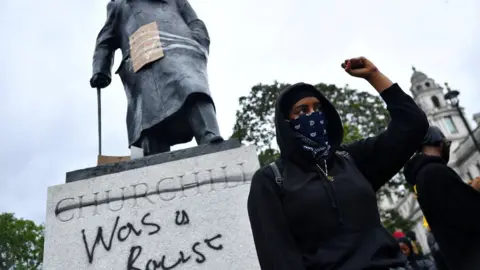 Reuters
ReutersIn Parliament Square in Westminster, a statue of Sir Winston Churchill was sprayed with graffiti and a Black Lives Matter sign attached to it.
Met Police Commissioner Dame Cressida Dick condemned the "violent criminality" by a "minority of protesters" as "disgraceful" and said it was "never acceptable" to attack police officers or damage property.
She said given the potential risk of coronavirus being spread at mass gatherings, people should find alternative ways to express their anger and frustration.
Avon and Somerset Police told the BBC 17 people have been identified in connection with the toppling of Colston's statue. No arrests have yet been made.
Chief Constable Andy Marsh defended the decision taken by commanders on the ground not to intervene when the statue was torn down and dumped in the harbour.
He said arresting suspects could have had "very serious ramifications" for the city of Bristol, including injuries to protesters, police and bystanders.
Labour leader Sir Keir Starmer told LBC radio that the statue should not have been torn down by protesters - but added that it was wrong for the monument to have remained in place for so long.
Slavery 'not just a black story'
The curator of the International Slavery Museum in Liverpool, Jean Francois Manicom, said it would not be a problem for the museum to display the statue, as it was not "afraid to face things of the past".
He told BBC Radio 4's PM programme that the UK's history of slavery was "not only a black story".
The co-founder of UK Black Pride, Phyll Opoku-Gyimah, also suggested that children in school should be taught more about Britain's role in the slave trade.
She said when people look at the how Britain benefitted from slavery, "you cannot divorce yourself from... how what we have in this country today [is] based on the economic wealth people have received through slavery".
"This is not about wanting people to feel guilt - because guilt serves no purpose - but this is about understanding the historical context of how colonisation have really had an impact a disproportionate impact on those who are black, Caribbean and also Asian," she said
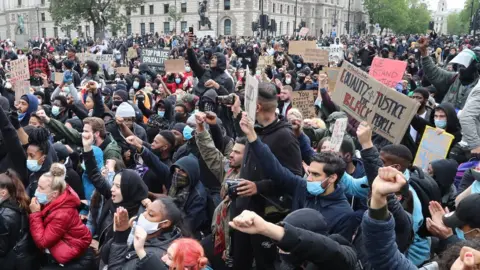 PA Media
PA MediaPaulette Simpson, the director of the Voice, one of Britain's leading black newspapers, said people had a "legitimate right" to protest issues that have "reached boiling point", but urged people "to restrain themselves" and to try to "contain" their emotions.
She said she did not feel the violence had "hijacked" the protests' message.
Addressing protesters, she said: "We know that you're angry, we know that you're in pain, we know that the you feel there's no other route to express yourself."
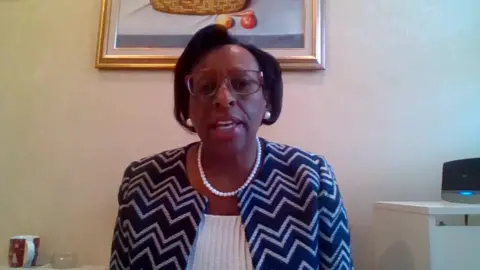
Ms Simpson questioned why the UK still has statues, symbols and names of streets "that remind us of a very dark place in history", and urged the government and others to "listen" to those who call for their removal.
John Apter, national chairman of the Police Federation, said while he understood there was "an awful lot of anger and frustration" his "concern and sadness" was that the "legitimate message" of the protests had been "hijacked by some who are intent on violence" against police.
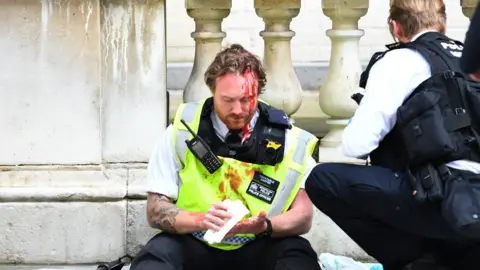 Reuters
Reuters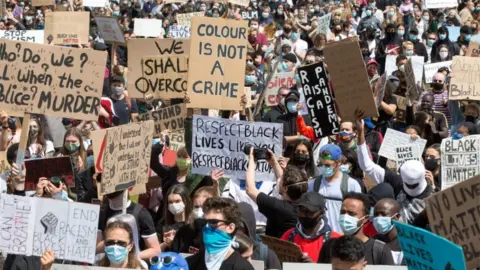 EPA
EPA
How George Floyd's death resonated in the UK

Meanwhile, opposition MPs have criticised comments made by Health Secretary Matt Hancock that the UK protests were fuelled by events in the US "rather than here".
Shadow justice secretary David Lammy said that racism and prejudice exist in the UK, as well as across the Atlantic, and that to suggest there is only a problem in the US "shows real ignorance".
Mr Lammy tweeted: "We must turn this moment into one of change and justice in the UK too."


- WHO IS WATCHING YOU WORK? The future of working from home
- MISSING FOOTBALL? Watch The First Team


Have you been affected by the issues raised in this story? Share your experiences by emailing [email protected].
Please include a contact number if you are willing to speak to a BBC journalist.
- WhatsApp: +44 7756 165803
- Tweet: @BBC_HaveYourSay
- Send pictures/video to [email protected]
- Upload your pictures / video here
- Please read our terms & conditions and privacy policy
